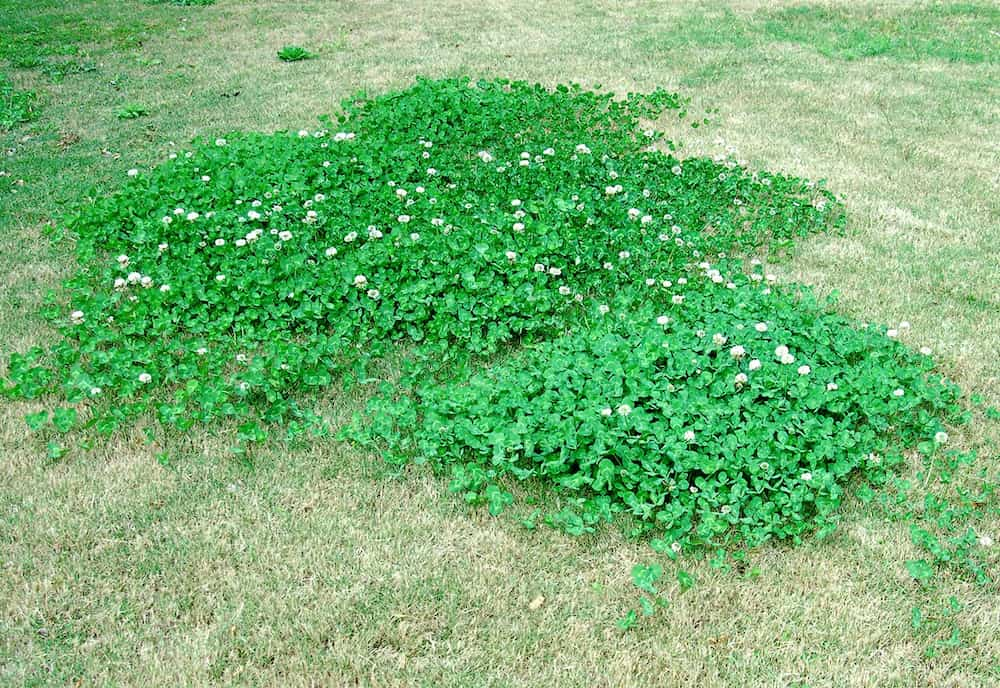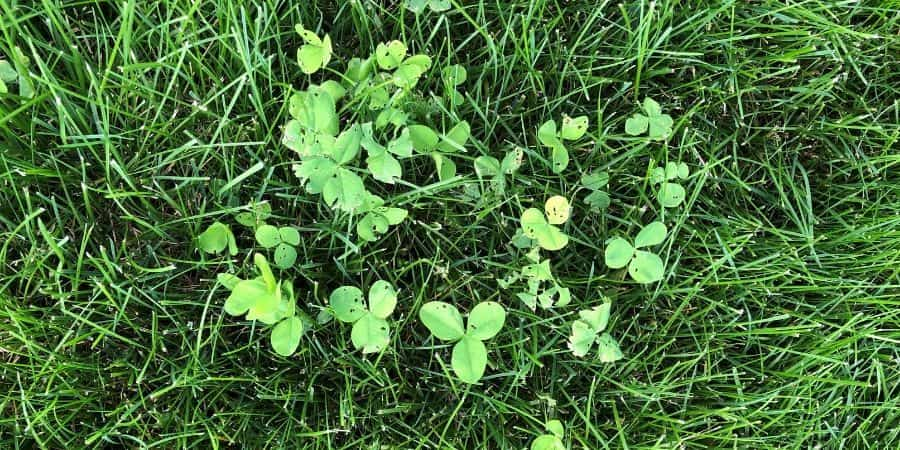
If you want your lawn to be entirely grass, you must learn how to get rid of clover in lawn. When clover is not wanted in the yard, other tactics are required because it can survive close mowing.
The good news is that there are a few different techniques you can use to eradicate clover, just like when you are getting rid of dandelions or crabgrass. Clover’s trifoliate leaves and flowers will compromise the appearance of your lawn. Additionally, if you’d rather not use chemicals in your backyard, they don’t necessarily require the use of weed killers.
Utilize our instructions and professional advice to learn how to eradicate clover from a lawn.
Table of Contents
How To Get Rid Of Clover?
Here are the top ways to eliminate clover in your lawn the natural way:
Pull It Out By Hand
Clover can be eliminated using nothing more than your own efforts and a few gardening tools.
You can easily remove the plants by using a hand fork. ‘As Samantha Richards of Gazeboshop suggests, “Pluck the clover up, making sure you have removed all the roots along with it.” ‘This approach is less expensive than purchasing a new spray product and guarantees that you haven’t killed your grass.’
Deprive It Of Oxygen And Sunlight
Clover can be killed by denying it any oxygen or sunlight. Cover the patch with plastic sheeting or a garbage bag, and secure the corners with rocks to prevent it from flying up. In a few weeks, this should eliminate the clover. Be aware that using this method will also kill any grass that gets underneath the plastic.
Ammonia
The weed will be burned by this chemical substance. Apply lawn-specific ammonium sulfate when the soil is wet (after a rainy day). Otherwise, you can use a hose to wet the grass before applying the product. To avoid damaging other areas of the lawn, make sure to only pour it on the clover. Before making use of this substance, it is advised to seek professional advice. Your lawn could get damaged if you don’t know how to use it properly.
Herbicide
A variety of herbicides are available to eradicate weeds. They enable the management of a wide variety of weeds, including clover, in Quebec. It is advisable to seek the advice of a lawn treatment specialist who can guide you in selecting the herbicide that is both the safest and most effective.
Make sure the herbicide doesn’t harm other plants by applying it directly to the clover. Be aware that mature clover may not have its root system destroyed by herbicides, allowing it to regrow. If you choose to use this kind of chemical, a hot, windless day is the best time to do so. The product will respond more effectively under these weather conditions.
With Weedkiller
On a lawn, clover can be targeted with weedkiller. ‘Make sure the weedkiller you use is specifically designed for lawns because using a generic one will also kill the grass, advises Ruth Hayes. ‘Apply these products before August, when they lose some of their potency. There are many efficient products on the market. Also keep in mind that clover produces a lot of seeds on its own, so you might have to deal with more plants the following spring.’
Always adhere to the weedkiller use instructions provided by the manufacturer. ‘Ruth advises against using weedkiller on freshly planted lawns because it will damage the grass. Also, don’t add lawn clippings that have been treated with weedkiller to the compost pile.
Spray A Vinegar Solution
This natural home remedy allows you to make your own non-toxic weed killer.
- Combine 1 cup vinegar, 1 cup water, and 1 drop dish soap.
- Spray it onto any clover patches after shaking it up. The clover’s leaves will become drier thanks to the vinegar, and the dish soap will ensure that it sticks.
- To completely eradicate the clover, you might need to spray over a period of weeks. Unfortunately, spraying the solution carelessly could harm the grass.
By Mowing
Mowing can be beneficial if the issue affects more plants than just a few. The RHS advises raking the lawn first to remove the clover stems before mowing it. The experts advise using a grass catcher to lessen the chance of seed dispersal.
Fertilizer Rich In Nitrogen
The lawn is frequently harmed by nitrogen deficiency, which also encourages clover to emerge. Therefore, this weed is eliminated by using such a fertilizer. Based on the state of the clover in your lawn, decide which kind of fertilizer to use. Select an organic fertilizer if clover is only present in sparse areas. If not, you should use a quick-release fertilizer to get rid of the weed right away. Every month, preferably in the spring, or in accordance with the instructions on the product label, spray the fertilizer directly on the clover.
Apply An Organic Herbicide
Apply for A.D.I.O.S. which is a selective, organic herbicide that will kill clover but not harm surrounding grass. Simply spray it on clover to weaken and kill the weed.
See more about
How To Detect A Clover?
A perennial, clover is found almost everywhere, including in flowerbeds, vegetable gardens, alleys, and lawns. It can be recognized by its three-leafed leaves or by its small, white flowers, which are grouped together in clusters.
One of the most prevalent weeds in gardens is white clover. It can grow in a variety of environments, but it prefers sparse lawns with little grass competition. Where a stem node touches the ground, white clover forms roots that spread outward in a creeping fashion. The months of April through September are when clover flowers bloom. It is necessary to fight clover all year long.
Does A Lawn Allow Clover?
In a lawn, clover is usually acceptable. If you want to create a wildlife garden, it will be useful because it gives insects nectar to drink. A flower-covered lawn can also be very appealing. Even clover lawns are becoming more popular as an alternative to traditional grass lawns. However, eliminating clover from a lawn is necessary if you want grass free of weeds.

Why Is Clover Growing On My Lawn?
Clover may appear in your lawn for a number of reasons, the majority of which are related to the soil.
- Wrong Soil pH: For most lawns, a soil pH of 6.0 to 7.0—which measures how acidic or alkaline the soil is—is ideal. It will be more difficult for grass to grow on your lawn and much easier for clover if the soil is too acidic. Fortunately, you can adjust the pH using soil amendments like lime.
- Poor Nitrogen Levels: Insufficient nitrogen in the soil makes clover thrive. While clover can obtain the necessary nitrogen from the air, effectively producing its own fertilizer, grass requires the presence of nitrogen in the soil to grow well. If you’ve applied too much quick-acting fertilizer, your soil may be nitrogen deficient. While they encourage quick grass growth, they may eventually cause your soil’s quality to decline. You can prevent this by switching to organic fertilizer, like manure or cornmeal.
- Compacted soil: Your grass can’t get the water, air, nitrogen, and other nutrients it needs if the soil is compacted. Thankfully, a core or spike aerator can be used to dissolve compaction.
Preventive Methods To Avoid The Appearance Of Clover
Lawn Fertilization
By using this technique, your lawn will be properly maintained, which will stop weeds like clovers from sprouting up there. Once a year, in the spring, fertilizing the lawn makes it healthier and less weed-prone.
The Importance Of Mowing
Make sure to mow your lawn as often as necessary so that it is higher than clovers. In order to avoid cutting the grass too short, it is best to set your mower at a height of 8 to 10 cm. By doing this, the grass will eventually smother and engulf the clover, preventing it from receiving the sunlight that it needs to grow.
Adequate Watering
To stop clovers from growing, water your lawn once or twice a week. Weeds cannot grow in your garden lawn when it has the right nutrients. Avoid dehydrating and starving your lawn of nutrients because it won’t be able to defend itself. It should be watered once or twice a week to achieve the best results.
The Reasons Why You Might Want To Leave Clover In Your Lawn
Clover may not be your favorite plant to look at, but it has advantages for your lawn.
- Natural Fertilizer: Because of the symbiotic relationship that clover has with helpful bacteria, it can take in nitrogen from the air. In the end, it might make your lawn more lush and green. This will keep it growing, though, and it will continue to outcompete your grass.
- Weed Prevention: Clover and other weeds won’t grow if you mow your lawn closely. However, allowing clover to flourish is a good choice if you prefer neat, short grass that is under 3 inches in length. It is difficult for other weeds to establish roots, grow, and compete with your grass because of the shade that clover’s leaves cast over the soil.
What Can Kill Clover But Not The Lawn?
Clover can be killed by lawn weedkillers, but they won’t harm the lawn, even if multiple applications are required. The process will probably need to be repeated in the spring because clover self-seeds.
Online, you may see recommendations for homemade weed killers that contain vinegar, but since vinegar can also kill grass and clover, we don’t suggest using this approach.
If there are only a few clover patches, the lawn won’t be harmed by simply removing them by hand.
Frequently Asked Questions
Grass Won’t Be Killed By What, But Clover Will?
As with corn gluten meal, A.D.I.O.S. selective organic weed control eliminates weeds without harming lawn grasses.
Should I Remove The Clover From My Lawn?
There are several factors that may influence your decision to leave clover in your lawn. Clover functions as a natural fertilizer because of its symbiotic relationship with bacteria. Nitrogen is obtained by clover from the atmosphere and released into the soil. Clover outcompetes other weeds, which is another advantage. So you could have clover instead of something unwanted and unsightly.
How Can Clover Be Managed?
Fertilizer can be controlled by fertilizing properly, mowing high, applying corn gluten meal or a vinegar solution, hand-pulling it, denying it oxygen and sunlight, spraying it with an organic pre-emergent herbicide, or using a conventional herbicide.
Why Is Clover Destroying My Lawn?
In the right circumstances, clover can completely take over your lawn. Low grass, an unfavorable soil pH, compacted soil, and low nitrogen levels are all excellent clover growing environments.